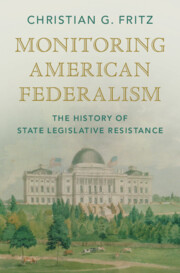Book contents
- Monitoring American Federalism
- Studies in Legal History
- Monitoring American Federalism
- Copyright page
- Dedication
- Contents
- Acknowledgments
- Introduction
- 1 The Riddle of Federalism and the Genesis of Interposition
- 2 Early State Use of Interposition: Testing the Powers of the New National Government
- 3 State Interposition and Debates over the Meaning of the Constitution
- 4 The Virginia and Kentucky Resolutions and Madison’s Report of 1800
- 5 State Interposition during the Jefferson and Madison Presidencies
- 6 State Challenges to the Supreme Court’s Control over Constitutional Interpretation
- 7 The Transformation of Interposition: The Theory of Nullification Emerges
- 8 State Interposition and Nullification on the Path to Secession
- 9 State Interposition during and after the Civil War
- 10 Modern Interposition by States and “Nullification”
- Abbreviations
- Notes
- Selected Short Titles
- Index
9 - State Interposition during and after the Civil War
Published online by Cambridge University Press: 05 January 2023
- Monitoring American Federalism
- Studies in Legal History
- Monitoring American Federalism
- Copyright page
- Dedication
- Contents
- Acknowledgments
- Introduction
- 1 The Riddle of Federalism and the Genesis of Interposition
- 2 Early State Use of Interposition: Testing the Powers of the New National Government
- 3 State Interposition and Debates over the Meaning of the Constitution
- 4 The Virginia and Kentucky Resolutions and Madison’s Report of 1800
- 5 State Interposition during the Jefferson and Madison Presidencies
- 6 State Challenges to the Supreme Court’s Control over Constitutional Interpretation
- 7 The Transformation of Interposition: The Theory of Nullification Emerges
- 8 State Interposition and Nullification on the Path to Secession
- 9 State Interposition during and after the Civil War
- 10 Modern Interposition by States and “Nullification”
- Abbreviations
- Notes
- Selected Short Titles
- Index
Summary
The Civil War marked the high point of state interposition resistance to the Union or Confederate governments. Sounding the alarm interposition occurred wherever governors and legislators believed their national government had exceeded its powers, particularly with the use of martial law, suspension of the writ of habeas corpus, and wartime conscription. Moreover, Lincoln’s use of emancipation as a war measure was criticized in North and South as going beyond the effort to preserve the Union and instead converting the war into an abolitionist-inspired moral crusade to end slavery and expand Black rights. After the Civil War, opposition mounted in state legislatures in the North and South to the Thirteenth, Fourteenth, and Fifteenth Amendments, Reconstruction policies, racial equality, and enhanced national power. The slogan of states’ rights was adopted by those who denied the outcome of the Civil War and by advocates of white supremacy. By the end of Reconstruction, interposition essentially died out, tainted with the discredited notion of nullification, secession and the Civil War, and lay dormant before its reemergence in the twentieth century.
Keywords
- Type
- Chapter
- Information
- Monitoring American FederalismThe History of State Legislative Resistance, pp. 257 - 286Publisher: Cambridge University PressPrint publication year: 2023

